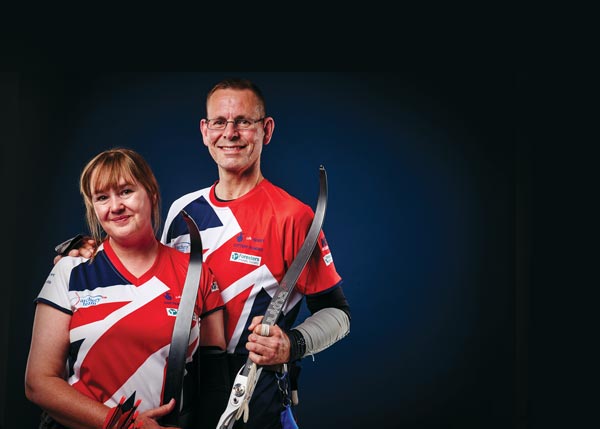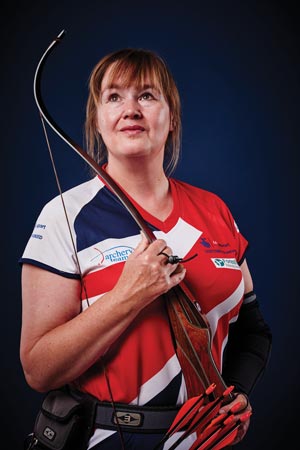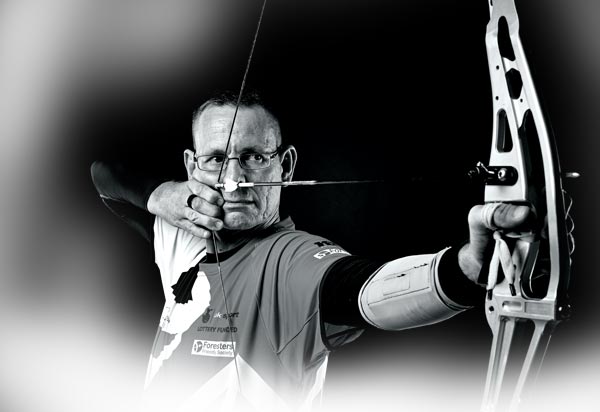Masters of the World: Barebowers Michaela Lake and Jason Meehan were two of the most successful archers at this year’s World Masters Games – Bow International sits down with them both and finds out how they did it

There was no intensive coaching, sponsors, or even a game plan, but their passion for archery has led both of them to shooting for Great Britain, and returning from the World Masters earlier this year with golds in target, indoor and field archery
Neither Michaela Lake nor Jason Meehan had what you would expect in the way of a beginning for an international archery career. Michaela was persuaded – after three years of following her daughter round field courses – to do a beginner’s course so she could join in, and Jason switched from playing squash after damaging the cartilage in his knees. There was no intensive coaching, sponsors, or even a game plan, but their passion for archery has led both of them to shooting for Great Britain, and returning from the World Masters earlier this year with golds in target, indoor and field archery.
Michaela says, “I loved it so much, and was so enthusiastic, and just wanted to shoot every day. I just kind of ran with it, and within eight months I’d won county, southern counties and English championships in field, and southern counties clout. Within 18 months I had scores for the British team for 3D field, and in three years seven months I got my silver medal in the Europeans. It was within just over four years to get to four gold medals at the World Masters, so a swift rise into it, and I just hope it’s not a swift drop out as well!”
Jason adds, “I tried archery, loved it, shot target for the first few months, discovered field and ran with that. The first two lessons were with sights on, but as soon as I could take my sights off it just felt very liberating. I got Bowman in my first year, then Master Bowman and Grand Master Bowmen in target, then the same in field. October 2011 I started, I’ve managed to go to four internationals so far: World Championships 3D, European Championships 3D, World Championships Field, European Championships Field, and I’ve managed to qualify for them both again.”
The Masters was Michaela’s idea – and since it was such a distance to travel (the 2017 event was in New Zealand) they decided to enter all the categories available. They both really enjoyed it, exceeding all their expectations, as Jason says, “I hoped I’d get something for indoors, and I hoped I’d do at least fairly well at WA field, but I didn’t think about getting medals … indoors was probably my best chance because I’m British indoor champion so I thought I might have a look-in for something there. We did so much better than expected!” Michaela adds, “We were hoping for a medal, but didn’t think we’d both get a clean sweep though everything, did we?”
Whereas Jason started his beginner’s course with sights – taking them off as soon as he was able because, as he puts it, “it felt like my bow arm was swinging all over the place trying to look through the sight” – Michaela has never shot with them at all. Jason says he felt ‘much more natural’ looking down the arrow, and his bow arm felt steadier and his groups closed up, whereas Michaela’s concerns about sights are rather more technological in nature: “I never put them on because, technically, I’m absolutely hopeless. It’s enough for me to have a string and a basic wooden bow – any more technical and the slightest thing that goes wrong I’m straight to my coach. I can’t work any of it out myself, I’m really hopeless.”
The coach is a major point of difference between the two champions – Michaela has regular sessions with one, whereas Jason hasn’t had any coaching since his beginner’s course. He explains, “Being as I think archery’s the art of repetition, I just do what’s comfortable, and it’s far easier to repeat what’s comfortable. If you’re trying to hold the conventional proper form, there’s just too much to think about, I just let my body do it. I’m sure I’ve got plenty of bad habits – I only started using a finger sling last year, I used to grip the bow, and you know everyone tells you that’s not the thing to do, so each time I plateau, I look for one thing that possibly I can change and move along a little bit. In field especially there’s so many good archers, and you speak to 50 archers and they’ll have 48 different opinions on how to do something; I listen to everyone and then possibly go and try little bits and bobs, but I don’t think I’d react well to a coach, especially now.”
He does acknowledge coaching is essential for getting through a beginner’s course, and that many people do benefit from it, but for Michaela coaching represents something altogether more central for her archery. “I see my coach regularly,” she says, “at the slightest thing, anything I feel is going on with my bow or me. I need quite regular affirmation, basically, that I can do it and so I go for coaching quite regularly to check through my equipment – all sorts of things, but I’m really pro-coaching. The opposite to Jason, but I think I need quite regular help.”
Jason adds, “The other thing is that when I started at my first club, all the coaches were recurve shooters, so they didn’t really have any idea about anything to do with barebow. Owing to the style I wanted to shoot there was no-one around who could give any helpful advice – they would watch you shoot a couple of arrows and tell you to put sights on. So it was just kind of picking bits us as you go along, especially as I got into field, and everyone is so helpful in archery.”
With the topic of conversation back on competition, Jason admits, “To be brutally honest I didn’t actually find the competition at the Masters as hard as the domestic competition. I think the archers over here are very good and mostly our weekend competitions are World Archery ones, and the people we shoot against week in, week out, are striving for scores for the British team. We shoot against what feels like really dedicated, hardened archers here, even indoors.” Michaela agrees the standard of barebow archery in the UK is high – and getting higher with the growth of events like the indoor barebow championships, held concurrently over several venues. “It was great,” Jason concludes, “I mean, there were lots of nations there, but I kind of think it’s harder shooting here than it was at the Masters. It was great fun, but it’s harder shooting domestically week in, week out!”

Neither have had any intense training in high-level competition, and both have had to find their own feel for it and their own methods of coping and developing. Jason is one of those people that never seems to feel pressure, saying, “Having started a little later in life, I just do it for fun. So I feel there’s a lot less pressure on me than on someone who’s maybe 19 and sees a long archery career in front of them. And I shoot each arrow; if I’ve shot a bad arrow there might be a harrumph, but then it’s gone, it’s one arrow at a time, and I always remember I’m there for fun. I’m a happy shooter.
“I’m never going to make a living from it; I do it for fun. I think some of the really top archers, there’s so much expectation from others and from themselves, all you need is a slight bit of tension and it alters your shot, and that’s a vicious spiral.”
Michaela, by contrast, finds the pressure of big events brings out her best performances: “I’m fortunate then when I go to a big tournament I’m able to step it up a gear, and I’m not quite sure what kicks in, but it just kind of does and I change.”
“Pressure actually works for you,” confirms Jason. “I think it was in Terni, the first round you didn’t do well, and you put a huge amount of pressure on yourself and actually, that brought you up.”
“Yeah,” Michaela agrees, “If I don’t have it, I don’t shoot very well. Sometimes my practice is absolutely appalling, and people must look at me and think how on earth does she get where’s she’s got, shooting like that? And I turn up at a tournament and I’m almost like a different person.” The bigger the tournament, and the more pressure there is, the better she does, though she says she still can’t figure out why that is!
The Masters is an open entry event, and both Jason and Michaela are keen for more archers to know just how accessible it is. “You don’t have to qualify in the same way you do for the GB squad, you can just go along,” Michaela explains. Jason adds, “Actually, lots of internationals you can go to without qualifying as a great holiday. If you look at IFAA, so long as you’ve got a couple of shoots under your belt you can just pay your money and turn up.”
Despite having enjoyed success at target, field is the area they’re really passionate about. Michaela cites the variety of targets and landscape, and the sheer amount field gives you to think about over the day – “You’ve got to decide fairly quickly where you’re going to point your arrow, do a good, strong shot and hope it works. You haven’t got much time to adjust, and there’s quite a lot to consider in that short space of time, and I really enjoy all that. When you’ve finished the course you’re absolutely mentally exhausted as well as sometimes physically, if there’s a lot of hills.”
Jason likes the options it provides for unsighted archers, with more opportunities to shoot at a higher level for barebowers than target provides. It’s easy to make friends quickly too, as you’re travelling the course with the same group – and competing is one of the fastest ways to learn more. “You do learn a lot by going to tournaments, you pick up a lot of information,” Michaela says, as Jason half-jokes “It’s how I picked up everything!”
Competing is an enormous part of their lives, so much so that paradoxically it gets in the way of day-to-day archery, as Jason explains; “All I’ve got is weekends, and most weekends I’m shooting a tournament so I virtually don’t get any practice at all. For the Masters, as far as the target round goes, I went and shot I think half a dozen arrows before it got dark one night at my club just to guestimate the distance, and that was my practice.”
Michaela, with the option of flexitime and fewer roadworks impeding her weeknights, adds, “I get quite a lot more than you. But I think I need a lot more practice – I think I’m a lot less natural; I think I need more work, so I think I need the practice regularly and to re-affirm the good shots because I can very easily go off. Now I recognise when a bad habit is kicking in because I’ve done just about every bad habit in the book!” Practice for field is made harder when tournament organisers set up specific targets, such as exceptionally steep uphill or downhill shots, just for events – making working on shooting them almost impossible.

“I didn‘t actually find the competition at the Masters as hard as the domestic competition”
In addition, both make use of visualisation techniques. Michaela says, “I find just thinking about my shot sequence is a real help, thinking about how I release, how I should release, and I think about the speed at which I do everything. At the World Masters, because target isn’t my natural thing to shoot, I sat down quietly, just thinking, ‘Right, how do I shoot this target at 60 metres’ and before I shot I thought about where my aiming point is, and just went over that while everyone else was pacing up and down and shooting loads of arrows, and actually that was what worked for me.”
Jason uses visualisation, too, but in a different way: “I think about the shot half a second in front of what I’m actually doing,” he reveals, “I think about drawing up and then I’m drawing up, and as I’m at full draw I think about loosing the arrow, and as it lands in the gold in my mind that’s when I let go, so I’m half a second behind myself for every shot. I watch it go in the gold, and my arrow follows it – hopefully.”
Despite all the difficulties, both are adamant there is more to be gained than lost by competing, at every level from local to international, no matter when in life you come to archery. “The key is to enjoy it,” Michaela says, and Jason agrees, saying “The thing with archery is there’s no cut-off age. You can start at 60 and still have a fantastic time. There are people from nine to 90. I think one of the biggest problems is you get a lot of people, and they can shoot for 20 years at a club and they’ll never go anywhere else, and you’ll talk about competitions or trying field and they go, ‘Oh, I’m not good enough for that,’ or ‘I’ll lose too many arrows’, or ‘I don’t want to show myself up’, and really and truly if they would just try it once their horizons would just keep expanding. It’s just for fun. It’s not a case of you have to be right at the top of your game before you can leave your club and go and shoot somewhere.”
Finally, when asked if there was one piece of advice they’ve picked up over their short but distinguished careers they would want to pass on, neither hesitated. Jason says, “Try more. Get out and shoot more, do more types of archery. Don’t be shy, don’t feel inhibited or that other people are going to be that much better than you – if you want to try field, go and shoot some field, go and try a different federation, go and shoot more.” Michaela nods, and concludes, “I think the key is just enjoying it, and smile a lot and laugh a lot and meet lots of people, and have a great time; I think that’s the key for me, is good fun.”
Four favourites
Round:
Michaela: “Oh gosh, that’s really tough! I think it’s got to be … WA Unmarked. Lots to think about in that round, good fun, lots of movement, lots of targets – it takes all day – it’s great.”
Jason: “It’s a lot of field craft as well as you’re having to guess face size and distance and everything else.”
> Ground:
M: “Ooh, I’m tempted to say Pentref.”
J: “I’m going to say Pentref.”
M: “I said Pentref first! I suppose second best then would be … Fort Purbrook, because it’s such good fun shooting down tunnels and over battlements and over ramparts and things.”
J: “I’d have to say Wrexham as second favourite, then Overton.”
Match:
M: “For me I suppose it was for the British [All British and Open Field Championships] last year in Ireland, because I got three gold medals and I broke the British record for the unmarked, the marked and the combined, and I got a gold medal for team, trad team and individual, so I suppose that’s got to be the one. That was a really good weekend! An eye-opener.”
J: “I would probably have to say Terni in Italy, my first international at the 3D World Championships. Just because I think there were absolutely beautiful courses and it was my first international.”
Opponent:
M: “That is really tricky. Ulrika Backman – I get on quite well with her, I shot with her at my first international, and we shot against each other in a medal tournament at the European 3Ds last year, and she’s really lovely, and it’s quite difficult shooting against someone in a head-to-head that you really like, because you have to put that aside, that you think ‘Aww, I’d really like it if they won!’ and I kind of feel that way about her. If she beat me, I’d kind of think ‘Yeah, I’m happy ‘cause she’s fantastic’.”
J: “It’s very hard to choose one person … but David Garcia I suppose. There’s so many fantastic archers, but he covers 3Ds and roundels and he’s fantastic at both and he’s such a nice chap, and again I was lucky enough to shoot with him in Terni and he just lets you know what a joy archery can be. He’s such a great archer and he’s such a great friend. It’s a shame to have to choose one person, but I suppose if I had to pick one person it would be David.”
This article originally appeared in the issue 124 of Bow International magazine. For more great content like this, subscribe today at our secure online store www.myfavouritemagazines.co.uk

